Timothy Ferriss's Blog, page 93
September 18, 2015
5 Morning Rituals That Help Me Win The Day
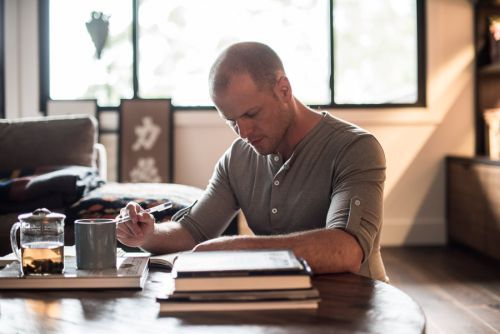
“If you see distraction externally, you end up creating an internally distracted state.” – Tim Ferriss
This episode of The Tim Ferriss Show is a bit of an experiment. Most the time, I interview world-class people, and I ask them many, many questions to try and figure out what makes them good at what they do.
Many of you have wondered what would happen if I flipped the script and had to answer my own questions. In this episode, I decided to do just that and answer one of your most common questions: what does your morning routine look like?
What you’ll find here are the five things I’d like to accomplish within the first 60 to 90 minutes of an “ideal day.” If I can hit at least three of these items, then I’ve won the morning. And, as the saying goes, “If you win the morning, you win the day.”
Let me know if you like this type of episode by responding to me on Twitter (@tferriss) or Facebook. Please let me know if you want more, never want to hear this type of podcast again, or suggest another question you’d like me to answer.
Enjoy!
Listen to it on iTunes.
Stream by clicking here
Download as an MP3 by right-clicking here and choosing “save as”.
Want to learn more about morning routines from a world-class entrepreneur? Listen to my conversation with Tony Robbins. In the episode below, we discuss Tony’s use of cryotherapy, his daily priming ritual, and how to get out of a slump. (Stream the episode below or right-click here to download.)
This podcast is brought to you by Wealthfront. Wealthfront is a massively disruptive (in a good way) set-it-and-forget-it investing service, led by technologists from places like Apple and world-famous investors. It has exploded in popularity in the last 2 years, and now has more than $2.5B under management. In fact, some of my good investor friends in Silicon Valley have millions of their own money in Wealthfront. Why? Because you can get services previously limited to the ultra-wealthy and only pay pennies on the dollar for them, and it’s all through smarter software instead of retail locations and bloated sales teams
Check out wealthfront.com/tim, take their risk assessment quiz, which only takes 2-5 minutes, and they’ll show you—for free–exactly the portfolio they’d put you in. If you want to just take their advice and do it yourself, you can. Or, as I would, you can set it and forget it. Well worth a few minutes: wealthfront.com/tim.
Mandatory disclaimer: Wealthfront Inc. is an SEC registered Investment Advisor.
Investing in securities involves risks, and there is the possibility of losing money. Past performance is no guarantee of future results. Please visit Wealthfront dot com to read their full disclosure.
This episode is also sponsored by 99Designs, the world’s largest marketplace of graphic designers. Did you know I used 99Designs to rapid prototype the cover for The 4-Hour Body? Here are some of the impressive results. Click this link and get a free $99 upgrade. Give it a test run…
QUESTION(S) OF THE DAY: What other questions would you like me to answer on the podcast? Please let me know in the comments.
Scroll below for the episode links…
Selected Links from the Episode
Dan Dapani’s website
Transcendental meditation
Vipassana meditation
Headspace meditation app
Calm app
Tara Brach and her thoughts on meditation
Sam Harris and his video on the psychology behind meditation
More about hanging techniques from Ido Portal
My pull-up rig and Teeter Hang Ups Gravity Boots
Lynx Teeter Hang Ups P3 Back Stretcher
One of Breville’s tea makers and the Adagio utiliTEA
Rishi-Tea Simple Brew Loose Leaf Teapot
My tea ingredients:
Pu-erh tea | Turmeric ginger | Green tea
Check out my blog post and video on making my Titanium Tea
The Five-Minute Journal
A look at my morning pages
If you like this type of advice and want more of my insider tips and tricks, as well as the latest of what I’m enjoying, please subscribe to 5-Bullet Friday.

September 14, 2015
Are Psychedelic Drugs the Next Medical Breakthrough?

The iboga plant (Photo: Marco Schmidt)
DISCLAIMER: DO NOT USE ANY DRUGS OR SUBSTANCES WITHOUT CONSULTING A MEDICAL PROFESSIONAL. THIS IS FOR INFORMATIONAL PURPOSES ONLY.
“Be curious.” – Dr. Dan Engle
Martin Polanco (@Martin_Polanco7), M.D., is the founder and program director of Crossroads Treatment Center, based in Rosarito, Mexico. Crossroads specializes in helping patients conquer powerful addictions (heroin, cocaine, etc.) by using the African hallucinogen ibogaine and 5-MeO-DMT, also referred to as “the God molecule.” Martin’s areas of expertise also include addiction medicine and therapeutic neurotechnologies.
Dan Engle (@drdanengle), M.D., is a psychiatrist and neurologist, who combines functional medicine with integrative psychiatry to enhance regenerative health and peak performance. His prior and relevant experience includes traumatic brain injury (TBI) and working in the Peruvian jungle with plant medicines such as ayahuasca.
In this episode, we step outside the lines of traditional medicine and discuss impulse control, introspection, and self-awareness through the use of powerful psychedelic and hallucinogenic agents like iboga, ibogaine, and 5-MeO-DMT.
We also discuss flotation tanks, which can simulate or even replicate many of the benefits that can result from the use of psychedelic and psychotropic agents. So you don’t have to be willing to experiment with these drugs to receive something valuable from this episode.
If you are interested in optimizing your psychological performance, emotional control, and exploring alternative medicine, then this episode is for you. Enjoy!
Listen to it on iTunes.
Stream by clicking here
Download as an MP3 by right-clicking here and choosing “save as”.
Want to hear more from a world-class scientist? Check out my conversations with James Fadiman, Ph.D. In the below episode, we discuss LSD and micro-dosing for creative problem solving, anxiety reduction, and more (stream below or right-click here to download):
This podcast is brought to you by TrunkClub. I hate shopping with a passion. And honestly I’m not good at it, which means I end up looking like I’m colorblind or homeless. Enter TrunkClub, which provides you with your own personal stylist and makes it easier than ever to shop for clothes that look great on your body.
Just go to trunkclub.com/tim and answer a few questions, and then you’ll be sent a trunk full of awesome clothes. They base this on your sizes, preferences, etc. The trunk is then delivered free of charge both ways, so you only pay for clothes that you keep. If you keep none, it costs you nothing. To get started, check it out at trunkclub.com/tim.
This podcast is also brought to you by Vimeo Pro, which is the ideal video hosting platform for entrepreneurs. In fact, a bunch of my start-ups are already using Vimeo Pro. WealthFront uses it to explain how WealthFront works. TaskRabbit uses it to tell the company’s story. There are many other names who you would recognize among their customers (AirBnB, Etsy, etc.) Why do they use it? Vimeo Pro provides enterprise level video hosting for a fraction of the usual cost. Features include:
Gorgeous high-quality playback with no ads
Up to 20 GB of video storage every week
Unlimited plays and views
A fully customizable video player, which can include your company logo, custom outro, and more
You get all this for just $199 per year (that’s only $17 per/mo.). There are no complicated bandwidth calculations or hidden fees. Try it risk-free for 30 days. Just go to Vimeo.com/business to check it out. If you like it, you can use the promo code “Tim” to get 25% off. This is a special discount just for you guys.
QUESTION(S) OF THE DAY: What other methods of alternative medicine and therapy are you interested in learning more about? Please let me know in the comments.
Scroll below for links and show notes…
Enjoy!
Selected Links from the Episode
More background and history about the psychedelic iboga.
More background and history about the psychedelic ibogaine.
More background and history about the psychedelic ayahuasca.
Commonly prescribed benzodiazepines:
More about traditional ayahuasca.
Quality resources for people who want to learn more about psychedelic drugs and their uses:
The background of 5-MeO-DMT.
More about the brain derived neurotrophic factor (BDNF)
Mating in Captivity: Unlocking Erotic Intelligence by Esther Perel
The Cosmic Serpent by Jeremy Narby
Autobiography of a Yogi by Paramahansa Yogananda
The Journey Home by Radhanath Swami
Ibogaine Explained by Peter Frank
Who by Geoff Smart
Man’s Search for Meaning by Viktor E. Frankl
If This Is a Man and The Truce by Primo Levi
The Psychedelic Explorer’s Guide by James Fadiman
Transcendental Meditation
True Rest Floatation Labs
Connect with Dr. Martin Polanco:
Twitter | Crossroads Ibogaine Center
Connect with Dr. Dan Engle:
Twitter | Temple of the Way of Light Ayahuasca Center in Peru | Onnit Labs
Show Notes
Dr. Dan Engle & Dr. Martin Polanco share their background experiences that led them to be working in the field of psychedelics [08:56]
Martin’s first experiences with psychedelics and Ibogaine [11:01]
The primary differences between Ayahuasca and Ibogaine [14:20]
Dan explains what happens when you experiment with Ayahuasca, and the most common characteristics during the experience [19:45]
What most people feel during the start of an Iboga experience, and the common characteristics reported after use [23:15]
The reasons some people don’t have visions while taking Ibogaine [26:34]
The commonly prescribed benzodiazepines that don’t allow people to have visions taking Ibogaine [27:44]
What happens to your central nervous system during an ibogaine experience [29:58]
How should people view the use of psychedelics? [36:24]
The scarier aspects of the iboga experiences, and how to prepare for them? [43:06]
Martin explains how iboga works on a chemical level and what types of addictions it can help [46:15]
The resources people can use to educate themselves about psychedelic drugs and current research [48:34]
The background of 5-MeO-DMT and how it is incorporated into his program [54:48]
Different uses for ayahuasca and 5-MeO-DMT [1:00:26]
The relative importance of plant medicine and non-traditional treatments [1:08:36]
How often should psychedelic treatments be used for the maximum effect [1:11:11]
How people can use psychedelics to help with traumatic brain injuries [1:16:30]
The first person who comes to mind when Dan and Martin think of the word successful [1:26:39]
The books Dan and Martin have given the most as gifts [1:28:45]
The quote or statement Dan would have on a billboard [1:31:01]
The advice Dan and Martin would give their 30-year-old selves [1:31:49]
Who should and shouldn’t try ibogaine [1:34:15]
Flotation theory and other entry points for psychedelic experiences [1:35:28]
The single ask or recommendation Dan and Martin have for The 4-Hour Workweek audience [1:44:50]
People Mentioned
Barry Jacobs
Adam Gazzaley
Roger Bell
Elon Musk
David Blaine

September 11, 2015
Drunk Dialing Fans–Celebrating The 100th Podcast Episode!
100 episodes! Whaaat?!
This celebratory episode involves me drunk dialing a bunch of you on Skype. We’ll get to that. But first, a little background and thank you…
My podcast–The Tim Ferriss Show–was started on a whim. It was intended as a break between big book projects. “I’ll do six episodes to get better at interviewing” was the grand goal.
In the first episode and after two bottles of wine, Kevin Rose nicknamed the show TimTimTalkTalk (damn you, KevKev). Later, after reviewing my ridiculously slurred and iffy questions (“If you were a breakfast cereal, which would you be?”), I let out a long sigh. I’ve always hated the sound of my own voice, but this was the worst. The podcast experiment wouldn’t last a month.
Or so I thought.
Now, here we are, passing the 100-episode mark. It’s crazy, and I can say one thing for certain — I’ve only made it this far because of YOU.
Your amazing feedback, support, questions, and comments are what kept this podcast alive. Amidst self-doubt (similar to this) and many mistakes, I’ve wanted to throw in the towel more than once. But, through thick and thin, you’ve been there, telling my monkey mind to chill the fuck out, to take a deep breath, to go to sleep, or to fight another day.
Many, many thanks.
And to celebrate, I decided on a throwback to episode #1. I posted a note on Twitter and Facebook asking fans to put their contact information in a short Google form (note: I’ve deactivated the link):
I’m going to be drunk dialing fans within 30 min, answering your questions! Just fill out this form and I might call: http://t.co/E4Xub881qB
— Tim Ferriss (@tferriss) September 8, 2015
The results of this vodka-infused orgy of telephonic idiocy is below!
We cover a lot of subjects, including:
Tantric sex
How I view and organize my various income streams
Marketing yourself in job interviews
My views (and challenges) with family and kids
How I dig out of negative downward spirals
And much more…
I also left semi-coherent voicemails for a number of you.
Once again, thank you so much for listening to this podcast. It means the world to me and keeps me going.
You guys rock.
Here’s raising a glass to many more adventures!
;
Listen to it on iTunes.
Stream by clicking here
Download as an MP3 by right-clicking here and choosing “save as”.
This podcast is brought to you by 99Designs, the world’s largest marketplace of graphic designers. Did you know I used 99Designs to rapid prototype the cover for The 4-Hour Body? Here are some of the impressive results. Click this link and get a free $99 upgrade. Give it a test run…
This podcast is also brought to you by Wealthfront. Wealthfront is a massively disruptive (in a good way) set-it-and-forget-it investing service, led by technologists from places like Apple and world-famous investors. It has exploded in popularity in the last 2 years, and now has more than $2.5B under management. In fact, some of my good investor friends in Silicon Valley have millions of their own money in Wealthfront. Why? Because you can get services previously limited to the ultra-wealthy and only pay pennies on the dollar for them, and it’s all through smarter software instead of retail locations and bloated sales teams.
Check out wealthfront.com/tim, take their risk assessment quiz, which only takes 2-5 minutes, and they’ll show you—for free–exactly the portfolio they’d put you in. If you want to just take their advice and do it yourself, you can. Or, as I would, you can set it and forget it. Well worth a few minutes: wealthfront.com/tim.
Mandatory disclaimer: Wealthfront Inc. is an SEC registered Investment Advisor.
Investing in securities involves risks, and there is the possibility of losing money. Past performance is no guarantee of future results. Please visit Wealthfront dot com to read their full disclosure.
Selected Links from the Episode
Barr Hill Vodka
How to Be a Star at Work by Robert Kelley
Who by Geoff Smart and Randy Street
The 22 Immutable Laws of Marketing by Al Ries and Jack Trout
Explore the Washington Speakers Bureau to learn about speaking rates
Stakes-setting tools – Coach.me | stickK | DietBet.com
How to Stop Worrying and Start Living by Dale Carnegie
Guerrilla Financing by Bruce Blechman and Jay Conrad Levinson
People Mentioned
Mantak Chia
AJ Jacobs
Ryan Holiday
September 7, 2015
“The Iceman,” Wim Hof
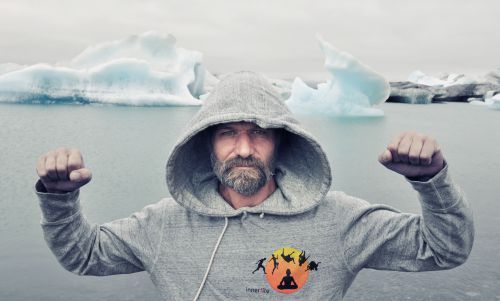
“Breath, motherfucker.”
– Wim Hof
Wim Hof (@Iceman_Hof) is a Dutch world record holder, adventurer and daredevil, commonly nicknamed “The Iceman” for his ability to withstand extreme cold. He is the creator of the Wim Hof Method and holds more than 20 world records. Wim is an outlier of outliers, as he routinely asks scientists to scrutinize and validate his feats. Here are just a few examples:
In 2007, he climbed past the “death zone” altitude on Mount Everest (~7,500 meters) wearing nothing but shorts.
In 2009, Hof completed a full marathon above the polar circle in Finland, in temperatures close to −20 °C (−4 °F). Dressed in nothing but shorts, Hof finished in 5 hours and 25 minutes.
Hof holds the current Guinness World Record for the longest ice bath, now set at 1 hour 53 minutes and 12 seconds.
But it’s not just cold.
In 2011, he ran a full marathon in the Namib Desert without water. The run was performed under the supervision of Dr. Thijs Eijsvogels. He can also run at altitude without suffering from altitude sickness.
In the same year, he was injected with toxins under doctor supervision and demonstrated that he could effectively control his autonomic immune response. Wim was able to raise his cortisol levels and lower his blood concentrations of cytokines (inflammatory mediators) using solely his meditation and prep techniques.
Not only this, but he was able to train others to achieve the same effect… with only 4 days of training!
We dig into all this and more. I loved this conversation and hope you do, too…
Listen to it on iTunes.
Stream by clicking here
Download as an MP3 by right-clicking here and choosing “save as”.
Want to hear a podcast related to the science of extreme performance? — Listen to my conversation with Laird Hamilton, widely considered the greatest big wave surfer of all-time and who practise Wim’s techniques. — stream below or right-click here to download:
This episode is brought to you by Audible, which I have used for years. I love audiobooks. I have two to recommend right off the bat:
The Graveyard Book by Neil Gaiman – Perhaps my favorite audiobook of all time.
Vagabonding by Rolf Potts – This book had a huge impact on my life and formed the basis for a lot of what has become The 4-Hour Workweek
To get your free audiobook and a free 30-day trial, go to Audible.com/Tim. You can choose from the two audiobooks listed above or from 180,000+ audio programs. They offer audiobooks, magazines, newspapers and even classes. It’s that easy. Go to Audible.com/Tim and grab your free audiobook.
This podcast is also brought to you by MeUndies. Have you ever wanted to be as powerful as a mullet-wearing ninja from the 1980’s, or as sleek as a black panther in the Amazon? Of course you have, and that’s where MeUndies comes in. I’ve spent the last 2-3 weeks wearing underwear from these guys 24/7, and they are the most comfortable and colorful underwear I’ve ever owned. Their materials are 2x softer than cotton, as evaluated using the Kawabata method. Check out MeUndies.com/Tim to see my current faves (some are awesomely ridiculous) and, while you’re at it, don’t miss lots of hot ladies wearing MeUndies.
QUESTION(S) OF THE DAY: What physical feats do you find most impressive? And what physical ability do you wish you could improve? Please let me know in the comments.
Scroll below for links and show notes…
Enjoy!
Selected Links from the Episode
The Vice documentary about Wim Hof.
Biology Now by Anne Houtman, Megan Scudellari, Cindy Malone, and Anu Singh-Cundy
Jonathan Livingston Seagull by Richard Bach
Wim explains the breathing and pushups method in this free video series
Connect with Wim Hof:
Show Notes
Wim’s first world record & his most challenging cold exposures [07:23]
What does Wim say to himself if he ends up in an unexpected situation and how does he deal with them [09:28]
How Wim controlled stress hormones and his immune response when he was injected with an endotoxin at the Radboud University [11:34]
The activities Wim took his subjects through on the first day of training to control their immune response to being injected with an endotoxin [17:46]
The reason Wim’s subjects don’t pass out when the oxygen in their blood reaches very low levels [22:14]
How the breathing exercises Wim puts his subjects through are used to control their immune response [26:13]
Can Wim control his immune response if he contracts a disease without realizing it? [27:33]
Why Wim is able to control his immune system and shield himself from diseases [29:22]
The ‘impossibles’ Wim thinks we will be able to prove are possible in the next 5 years [33:10]
What Wim recommends for someone who is depressed or a person just wants to lift their mood [38:19]
Wim’s eating routine and his typical meals [40:45]
Does Wim release more DMT during his breath work [43:58]
How Wim lowers his body temperature in a hot climate and trains himself to endure high temperatures [47:47]
How Wim learned 10 languages [53:03]
Wim discusses why people are fat, and how people can develop more brown fat [54:09]
How to start breathing for relaxation [56:49]
The person who comes to mind when Wim thinks of the word successful [59:27]
The steps Wim would tell someone to take if they don’t feel successful [1:00:02]
The book Wim has given to other people the most as a gift [1:02:20]
How Wim overcame dark times [1:04:17]
Wim’s routine in the first 60 minutes of each day [1:07:16]
Wim ‘s favorite exercises [1:11:44]
The musician Wim looks up to the most and his favorite albums [1:14:00]
The purchase Wim has made in the last year for under $100’s that has positively impacted his life
Wim finds his stones [1:15:28]
The advice Wim would give his 30-year-old self [1:17:19]
People Mentioned
Ray Cronise
Tim Noakes
Kevin J. Tracey
Dean Karnazes
Nelson Mandela
Michael Jackson

August 31, 2015
The Oracle of Silicon Valley, Reid Hoffman (Plus: Michael McCullough)

Reid Hoffman with Ana (top) and Michael (left) McCullough, co-founders of QuestBridge.org (Photo: Will Miller)
“I build, design, and improve human ecosystems through software either as a creator or an investor.”
– Reid Hoffman
Reid Hoffman (@reidhoffman) is often referred to as “The Oracle of Silicon Valley” by tech insiders, who look at his company-building and investing track record (Facebook, Airbnb, Flickr, etc.) with awe. Reid is Co-Founder and Executive Chairman of LinkedIn, which has more than 300 million users. He was previously Executive Vice President at PayPal, which was purchased by eBay for $1.5 billion. There, he was nicknamed “firefighter-in-chief” by CEO Peter Thiel.
Noted venture capitalist David Sze says of Reid, “[he] is arguably the most successful angel investor in the past decade.” They are now both partners at Greylock Partners.
In this podcast, he is joined by Michael McCullough, MD, a close friend, co-founder of QuestBridge.org, and a successful investor with training as an ER physician. Michael is as an Assistant Clinical Professor at UCSF and previously served as the on-call ER physician to the Dalai Lama. Michael is also a Rhodes Scholar, Kaufman Fellow, and Ashoka Fellow. An avid meditator, he is particularly interested in investing in technologies and companies pertaining to the mind.
We cover A LOT, including:
Meeting Mark Zuckerberg for the first time and deciding to invest in Facebook
“Fire-fighting” in startups and beyond
Using board games to develop strategy
Reid’s view of what Uber has done well and what they could improve
Some of Reid’s suggested philosophers for entrepreneurs
Non-technical founders and symbolic systems
Going “off algorithm” in the ER to manage life-and-death decisions
The 3 types of CEOs
What Reid has learned from his network, including the founders of Airbnb, Kiva.org, etc.
And, of course, we discuss QuestBridge, as Reid and I are both on the advisory board…
QuestBridge currently supplies more exceptional low-income talent to top universities than all other non-profits combined (more than 2,000 students a year on $500 million in financial aid). QuestBridge has created a single, standardized college application accepted by 36 top universities like Stanford, MIT, Amherst and Yale. This allows them to use innovative campaigns (e.g. laptop giveaway forms that double as college applications) to offer scholarships to kids who might otherwise not even think of college. If you want to break the cycle of poverty, QuestBridge is one of the most fascinating tools I’ve ever seen.
I’d like to invite all of my readers and listeners to pour benevolent gasoline on this fire by contributing to one of QuestBridge’s prizes in Science (STEM) or the Arts. Just click here to check them out. The “prizes” are giveaway items like laptops or internships, and when kids apply for a prize, they are simultaneously applying to college. Student applications are due September 28, so there’s still time to influence this year.
If you prefer, you can create your own prize for a group you feel strongly about, like top low-income women, top low-income students from any geographic area (e.g. your home state), or those kids interested in a particular career (e.g. engineering). In effect, you might say, “I’d like to encourage Hispanic kids in Chicago [or girls in Tuscon interested in computer science, etc.] to apply to college. I’m happy to offer three iPads,” or something like that.
It doesn’t take much, and it really works wonders. For instance, QuestBridge’s Native American prize (20 laptops total) increased the Native American applicant pool from 34 to more than 350 in
To create your own prize, or to simply discuss support or partnership, please reach out directly to Michael [AT] QuestBridge {DOT} org.
Again, to donate to existing prizes (e.g. STEM, the Arts, Rural), please click here. That’s a simple and fast way to make a real impact.
;
Listen to it on iTunes.
Stream by clicking here
Download as an MP3 by right-clicking here and choosing “save as”.
Want to hear another podcast from an early stage investor? — Listen to my conversations with Chris Sacca. In this episode, we discuss unfair advantages, how Chris chooses founders and investments, stories of missed opportunities, and the styles that differentiate Wall Street from Silicon Valley investors (stream below or right-click here to download):
This podcast is brought to you by MeUndies. Have you ever wanted to be as powerful as a mullet-wearing ninja from the 1980’s, or as sleek as a black panther in the Amazon? Of course you have, and that’s where MeUndies comes in. I’ve spent the last 2-3 weeks wearing underwear from these guys 24/7, and they are the most comfortable and colorful underwear I’ve ever owned. Their materials are 2x softer than cotton, as evaluated using the Kawabata method. Check out MeUndies.com/Tim to see my current faves (some are awesomely ridiculous) and, while you’re at it, don’t miss lots of hot ladies wearing MeUndies.
This podcast is also brought to you by 99Designs, the world’s largest marketplace of graphic designers. Did you know I used 99Designs to rapid prototype the cover for The 4-Hour Body? Here are some of the impressive results. Click this link and get a free $99 upgrade. Give it a test run…
QUESTION OF THE DAY: If you had the SAT scores and e-mail addresses of every high school student in the US, how would you increase the number of kids who apply to college?
Scroll below for links and show notes…
Enjoy!
Selected Links from the Episode
Learn more about Wittgensteinian language games
The Checklist Manifesto by Atul Gawande
Check out Avalon Hill, Reid Hoffman’s strategic board game
The Start-up of You and The Alliance by Reid Hoffman
Getting Things Done by David Allen
The 7 Habits of Highly Effective People by Stephen R. Covey
Conscious Business by Fred Kofman
Sapiens by Yuval Noah Harari
Learn more about Greylock Partners
Learn more about QuestBridge
Features on QuestBridge:
Connect with Michael McCullough
Connect with Reid Hoffman:
Linkedin | Greylock Partners | Twitter
Show Notes
How do you answer the question, “What do you do?” [7:33]
The circumstances of Michael McCullough’s birth [9:08]
Lessons learned from Reid Hoffman’s unconventional high school [10:03]
How Reid Hoffman evaluates the importance of a founder’s technical skills [11:33]
The philosophy of Reid Hoffman [12:58]
What it means to Michael McCullough to go off algorithm [17:08]
What it’s like to watch a person’s eyes as they pass from alive to not-alive [20:58]
What separates a good ER physician from a great ER physician [21:53]
What makes a good “entrepreneurial firefighter” and how to work with bureaucracies [24:03]
Recommendations for developing strategic thinking [30:13]
What Uber has done well and what could have been executed more effectively/strategically [33:08]
On meeting Mark Zuckerberg and investing in Facebook [35:28]
Mark Pincus’s role in Facebook when Reid Hoffman decided to invest [38:23]
On deciding not to take the role of CEO [39:53]
What founders should think about when deciding to hire a CEO [42:43]
Michael McCullough’s first 60-90 minutes, meditation, and neurofeedback [47:38]
Reid Hoffman’s morning rituals and how he works through creative problems [49:53]
The first thing that comes to mind when mentioning specific people in Reid Hoffman’s network [54:23]
Most gifted book [1:04:28]
Questbridge – What it is and what it does [1:26:53]
If you could have one billboard anywhere, where would it be and what would it say? [1:19:53]
Asks or requests for the listeners [1:20:48]
People Mentioned
Ludwig Wittgenstein
Peter Thiel
Sun Tzu
Carl von Clausewitz
Mark Zuckerberg
Sean Parker
Mark Pincus
Jeff Weiner
Brian Chesky
John Lilly
Elon Musk
Julie Hanna
Cory Booker
Charles Best
August 28, 2015
Brené Brown on Vulnerability and Home Run TED Talks
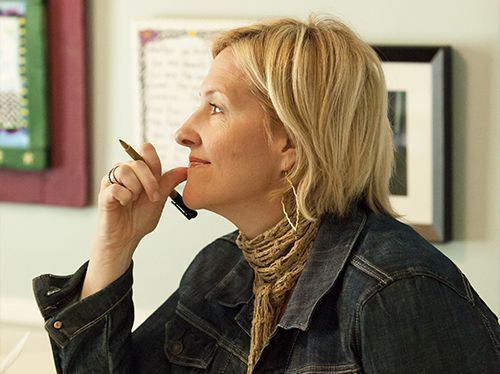 “He or she who is willing to be the most uncomfortable is not only the bravest but rises the fastest.”
“He or she who is willing to be the most uncomfortable is not only the bravest but rises the fastest.”
– Brené Brown
Dr. Brené Brown (@BreneBrown) is a research professor at the University of Houston Graduate College of Social Work. Brené’s 2010 TEDx Houston talk, The Power of Vulnerability, has been viewed more than 20 million times and is one of the top five most viewed TED talks in the world.
She has spent the past 13 years studying vulnerability, courage, worthiness, and shame. Brené is the author of two #1 New York Times bestsellers: Daring Greatly and The Gifts of Imperfection. Her brand-new book is titled Rising Strong. In it, she writes, “If we are brave enough, often enough, we will fall. This is a book about what it takes to get back up.”
She is also the founder and CEO for The Daring Way™, an organization that brings her work on vulnerability, courage, shame and worthiness to organizations, schools, communities, and families.
;
Listen to it on iTunes.
Stream by clicking here
Download as an MP3 by right-clicking here and choosing “save as”.
Want to hear another podcast with a world class emotional intelligence practitioner? — Listen to my conversations with Josh Waitzkin. In this episode, we discuss meditation styles, morning rituals and why you should study the artists rather than the art critics (stream below or right-click here to download):
This podcast is brought to you by Vimeo Pro, which is ideal for entrepreneurs. In fact, a bunch of my start-ups are already using Vimeo Pro. WealthFront uses it to explain how it develops personalized investment portfolios. TaskRabbit uses it to tell the company’s story. Twitter uses it to showcase Periscope. Why are they using it instead of other options out there? Vimeo Pro provides enterprise level video hosting that typically costs thousands of dollars for a tiny fraction of the cost. Features include:
Gorgeous high-quality playback with no ads
Up to 20 GB of video storage every week
Unlimited plays and views
A fully customizable video player, which can include your company logo, custom outro, and more
You get all this for just $199 per year (that’s only $17 per/mo.) There are no complicated bandwith calculations or hidden fees. Just go to Vimeo.com/business to check it out. If you like it, you can use the promo code “Tim” to get 25% off. This is the deepest discount you will find anywhere for Vimeo Pro.
This podcast is also brought to you by Wealthfront. Wealthfront is a massively disruptive (in a good way) set-it-and-forget-it investing service, led by technologists from places like Apple and world-famous investors. It has exploded in popularity in the last 2 years, and now has more than $2.5B under management. In fact, some of my good investor friends in Silicon Valley have millions of their own money in Wealthfront. Why? Because you can get services previously limited to the ultra-wealthy and only pay pennies on the dollar for them, and it’s all through smarter software instead of retail locations and bloated sales teams
Check out wealthfront.com/tim, take their risk assessment quiz, which only takes 2-5 minutes, and they’ll show you—for free–exactly the portfolio they’d put you in. If you want to just take their advice and do it yourself, you can. Or, as I would, you can set it and forget it. Well worth a few minutes: wealthfront.com/tim.
Mandatory disclaimer: Wealthfront Inc. is an SEC registered Investment Advisor.
Investing in securities involves risks, and there is the possibility of losing money. Past performance is no guarantee of future results. Please visit Wealthfront dot com to read their full disclosure.
QUESTION(S) OF THE DAY: What short-term discomfort are you avoiding now? What is preventing you from taking action? Please let me know in the comments.
Scroll below for links and show notes…
Enjoy!
Selected Links from the Episode
Watch Brené Brown’s TED Talks:
The Power of Vulnerability | Listening to Shame
The Gifts of Imperfection by Brené Brown
Daring Greatly by Brené Brown
Rising Strong by Brené Brown
I Thought It Was Just Me (but it isn’t) by Brené Brown
Women & Shame by Brené Brown
The Paradox of Choice by Barry Schwartz
Learn more about Liberation Theology and Grounded Theory
The Alchemist by Paulo
My favorite swimming goggles
Connect with Brené Brown:
Twitter | Instagram | Facebook | Courage Works
Show Notes
How Brené Brown answers the question, “What do you do?” [7:38]
What make a highly popular TED talk [1:45]
How Brené Brown prepares for TED talks [13:16]
Defining the terms “vulnerability” and “shame” (Learn more about how to deal with haters) [15:31]
Deconstructing shame from an evolutionary standpoint [24:31]
How to evaluate the question, “Are you daring greatly today?”[39:06]
Which schools of philosophy resonate most with Brown’s research? [46:31]
Misinterpretations of vulnerability [49:46]
How does vulnerability coexist with masculine virtues and traits? [55:31]
What are some daily practices or exercises to develop vulnerability? [1:02:46]
Brené Brown’s morning rituals [1:06:16]
Most gifted books [1:17:06]
Why she wrote Rising Strong [1:08:46]
Describing the method for collecting data for Rising Strong [1:09:41]
The ideal sequence for reading Brené Brown’s work [1:13:06]
The first thing that comes to mind when Brené Brown thinks of the word successful [1:14:31]
What purchase of $100 or less has most positively affected your life in recent memory? [1:15:51]
If you could have one billboard anywhere, where would it be and what would it say? [1:16:46]
Advice for Brené Brown’s thirty-year-old self [1:17:46]
Asks or requests for the listeners [1:19:19]
People Mentioned
Marcus Aurelius
Pema Chödrön
Joseph Campbell
Kahlil Gibran
Rumi
Mary Oliver
Neil Peart
Shonda Rhimes
August 26, 2015
How to Build a World-Class Network in Record Time
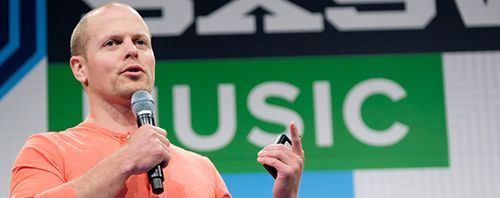
Photo by Ron Herrman
“Don’t dismiss people, don’t be a dick, and don’t rush. Play the long game.”
– Tim Ferriss
Welcome to a special edition of The Tim Ferriss Show. Back in 2007 I experienced a “Tipping Point” for The 4-Hour Workweek at South by Southwest (SxSW) that played a key role in the book becoming a worldwide bestseller. Ever since then I’ve been back almost every year.
This is a presentation I recently gave at SxSW about a better, more effective way to network. My suggestions might surprise you or seem counterintuitive, but I’ve found that the best way to network is by spending very little time networking.
In this episode you’ll learn:
How SxSW played a role in the success of The 4-Hour Workweek
Why it’s so important to attend events to build your network
The most common mistakes people make at events
How to interact with A-listers
How to enjoy the ride and come away on top
And much, much more…
If you are able to take away a few lessons from this talk and focus on long-term relationships instead of transactions, I hope you find that you’ll never have to network again.
;
Listen to it on iTunes.
Stream by clicking here
Download as an MP3 by right-clicking here and choosing “save as”.
Want to hear another podcast relating to memory? — Listen to my conversations with my friend Ed Cooke, a Grandmaster of Memory. In this episode, we discuss mental performance, imagination, and productive mischief (stream below or right-click pt 1 here pt 2 here to download):
Still looking for more? — Listen to my conversations with Pavel Tsatsouline on the science of strength and the art of physical performance (stream below or right-click here to download):
This episode is brought to you advertisement free. Want this to happen more often?
Every Friday I send out a very short email called 5-Bullet Friday. These are the coolest things I’ve been playing with that week. It could include favorite articles, gizmos and gadgets, and a lot of other awesome stuff you could use immediately.
Sign up for a week, and give it a try.
It would mean a lot to me and I think you’ll enjoy it. You can see a lot of people are excited about this on twitter.
QUESTION(S) OF THE DAY: In the keynote, I mentioned the importance of going to a single event each year and selecting the most expensive of your options. What event would you choose and why? Please let me know in the comments.
Scroll below for links and show notes…
Enjoy!
Selected Links from the Episode
Your Memory by Kenneth L. Higbee
Learn more about DonorsChoose.org
Show Notes
Hangovers at important events [7:20]
The three core tenants of successful networking [11:45]
Don’t make an impression, leave a memento [17:00]
Why ignorance can be bliss [18:33]
How to pitch “A-listers” [24:44]
How to pick people out of a crowd [28:00]
What to ask instead of, “What do you do?” [30:00]
How to escape conversations [31:10]
How to play the long game [34:35]
Can you have too many mini-retirements? [36:40]
If you were launching a new company with only $1,000, what would you start? [37:30]
Do you meditate or do yoga? [38:45]
How do you find good events and parties? [39:35]
Now that you’re a big deal, what are your goals at SxSW [40:35]
What thought leaders do you follow? [41:10]
How do you stay focused? [41:45]
What part of your 4-Hour Workweek do you personally find hardest to follow? [42:50]
How do you want people to remember you? [43:45]
What tricks do you use for retaining info? [44:25]
Where is the best place in the world, besides Austin? [46:00]
What are you most excited about for this year’s SxSW? [47:00]
Have you tried polyphasic sleep? Does it work? [47:40]
What’s the most memorable “thank you” note that you’ve received? [48:35]
Are you recording a podcast while you’re at SxSW [49:40]
What animal best describes you? [50:00]
I have a 9-5 job. Can The 4-Hour Workweek actually transform my life? [50:30]
What are the 3-4 best bodyweight exercises for business travelers? [51:25]
What’s the best way to respond to, “Do you have a business card?” when you don’t have one [52:50]
What do most entrepreneurs do wrong? [53:25]
What is the most memorable memento you have received? [54:10]
Advice for introverts [55:25]
What are some of the biggest lessons learned from starting your podcast? [56:00]
What are some tips on executing on all the great ideas gathered? [57:25]
What questions do you use for reflection and why? [58:30]
The NorCal Margarita
Here is a recipe for an excellent cocktail. With this you can reach an appropriate level of intoxication while avoiding the hangover the day after.
2 shots of high-grade tequila
Club soda
As much lime as possible
People Mentioned
Nassim Taleb
Alexis Ohanian
August 23, 2015
The “Wizard” of Hollywood, Robert Rodriguez
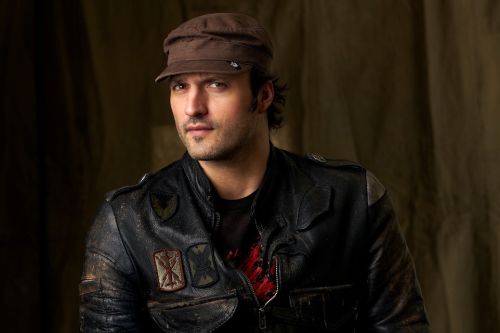
Robert Rodriguez, nicknamed “The Wizard.”
Robert Rodriguez (@Rodriguez) is a film director, screenwriter, producer, cinematographer, editor, and musician. He is also the founder and chairman of El Rey Network, the new genre-busting English-language cable network.
While a student at the University of Texas at Austin in 1991, Rodriguez wrote the script for his first feature film while he was a paid subject in a clinical experiment at a drug research facility. That paycheck covered the cost of shooting his film.
The film, “El Mariachi,” went on to win the coveted Audience Award at the Sundance Film Festival, and became the lowest budget movie ever released by a major studio. Rodriguez wrote about these experiences in Rebel Without a Crew, a perennial guide for the independent filmmaker.
Rodriguez went on to write, produce, and direct a series of successful films including, Desperado, From Dusk Till Dawn, the Spy Kids franchise, Once Upon a Time in Mexico, Frank Miller’s Sin City, and Machete, among many others.
I hope you find listening to this episode as enjoyable as it was to record.
Listen to it on iTunes.
Stream by clicking here.
Download as an MP3 by right-clicking here and choosing “save as”.
Want to hear another podcast with another award-winning movie maker? — Listen to my conversation with Brian Koppelman, co-writer/producer of Rounders, The Illusionist & Ocean’s Thirteen. In this episode, we explore how he got started, how he handles rejection, his big breaks, his creative process, and much more.
This podcast is brought to you by Athletic Greens. I get asked all the time, “If you could only use one supplement, what would it be?” My answer is, inevitably, Athletic Greens. It is my all-in-one nutritional insurance. I recommended it in The 4-Hour Body and did not get paid to do so. Get 50% off your order at Athletic Greens.com/Tim
This episode is also sponsored by 99Designs, the world’s largest marketplace of graphic designers. Did you know I used 99Designs to rapid prototype the cover for The 4-Hour Body? Here are some of the impressive results. Click this link and get a free $99 upgrade. Give it a test run.
QUESTION(S) OF THE DAY: What’s the biggest risk you’ve ever taken and what was the result? Please let me know in the comments.
Scroll below for links and show notes…
Enjoy!
Selected Links from the Episode
View more about the Directors Chair episodes here
Robert’s first movie, El Mariachi, and production company Los Hooligans Productions
The making of El mariachi – Rebel without a Crew
More information about Bedhead – the short film Robert made before El Mariachi
More information about Troublemaker Studios
Check out the movie Sin City
Check out the movie Desperado
Simon Sinek – Start with Why
Cooking School: Texas BBQ | Sin City Breakfast Tacos
Robert’s TV Network El Rey
Connect with Robert
Twitter: @ElReyNetwork | @Rodriguez | @DuskElRey | @LuchaElRey
Show Notes
How does Robert go about journaling? [05:04]
How does Robert keep moral high when working with a crew? [13:29]
Being creative on set [14:31]
“What clicked” that allowed Robert to be truly creative [15:57]
Embracing the creative process “in the moment” [19:28]
The amazing story of how El Mariachi was financed? [21:41]
What was the story behind El Mariachi getting released by Columbia? [24:45]
How to maintain the creative mindset once resources are no longer a creative driver [35:22]
How cartooning helped creative endeavors? [39:53]
The strange reason Robert changed the name of his production company to Troublemaker Studios [44:11]
What book does Robert most frequently gift to other people? [55:35]
The Directors Guild, Frank Miller, Sin City & the ‘Special Guest Director’ [57:41]
Why setting precedents are important [1:09:59]
How Robert spends his downtime [1:14:38]
Why was Robert so keen to make the movie Sin City? [1:19:54]
What does the first 60 minutes of Roberts’ day look like? [1:26:29]
Robert’s TV network, El Rey [1:32:52]
What is Robert geeking out on right now? [1:51:56]
Tips for early stage filmmakers [1:54:37]
What advice does Robert have for his 30-year-old self? [1:58:39]
Robert’s one request of you, the listener. [2:01:07]
People Mentioned
Francis Ford Coppola
Quentin Tarantino
Jim Cameron
Michael Mann
Robert Newman
Antonio Banderas
Jack Ma
John Carpenter
Winston Churchill
Simon Sinek
Frank Miller
George Lucas
Bruce Willis
Benicio del Toro
Robert De Niro
George Miller
General Stan McChrystal
Johnny Depp

August 18, 2015
The Person I Call Most for Startup Advice

“Desire is a contract you make with yourself to be unhappy until you get what you want.” – Naval Ravikant
Naval Ravikant (@naval) is the CEO and a co-founder of AngelList. He previously co-founded Epinions, which went public as part of Shopping.com, and Vast.com. He is an active angel investor and has invested in more than 100 companies, including more than a few “unicorn” mega-successes.
His deals include Twitter, Uber, Yammer, Postmates, Wish, Thumbtack, and OpenDNS, which Cisco just bought for $635 million in cash.
BUT, even if you have zero interest in startups or investing, this episode is well worth your time. This is really about the habits and beliefs of a highly successful (and happy) person.
Naval has refined his way of living in very unique ways, and you can borrow what he’s learned, read the books that have changed him, and experiment with the habits he has developed through trial and error.
Enjoy this conversation with a curious character!
Listen to it on iTunes.
Stream by clicking here
Download as an MP3 by right-clicking here and choosing “save as”.
Want to hear another podcast on meditation and “spirituality”? — Listen to my conversation with Sam Harris, PhD. In the below episode, we discuss “spirituality,” neuroscience, his meditation practice, and more (stream below or right-click here to download):
This episode is sponsored by 99Designs, the world’s largest marketplace of graphic designers. Did you know I used 99Designs to rapid prototype the cover for The 4-Hour Body? Here are some of the impressive results. Click this link and get a free $99 upgrade. Give it a test run…
This podcast is also brought to you by Athletic Greens. I get asked all the time, “If you could only use one supplement, what would it be?” My answer is, inevitably, Athletic Greens. It is my all-in-one nutritional insurance. I recommended it in The 4-Hour Body and did not get paid to do so. Get 50% off your order at Athletic Greens.com/Tim
QUESTION(S) OF THE DAY: What do you still want to know about investing, whether in startups or elsewhere? Or: What was your favorite takeaway from Naval? Please let me know in the comments.
Scroll below for links and show notes…
Enjoy!
Selected Links from the Episode
Love Yourself Like Your Life Depends On It by Kamal Ravikant
Lying by Sam Harris
Surely You Must Be Joking Mr. Feynman by Richard Feynman
Meditations by Marcus Aurelius
Striking Thoughts by Bruce Lee
The Origin of Species by Charles Darwin
Read the Melting Asphalt blog
Read the Dilbert blog, specifically, The Day You Became a Better Writer
Siddhartha by Hermann Hesse
The Power of Habit by Charles Duhigg
Go on a meditation retreat with noetic.org
Don’t Shoot the Dog! by Karen Pryor
Sapiens by Yuval Noah Harari
The Rational Optimist by Matt Ridley
Poor Charlie’s Almanac by Charlie Munger
Illusions by Richard Bach
The Origins of Virtue by Matt Ridley
Influence by Robert Cialdini
Snow Crash by Neal Stephenson
by Patrick Rothfuss
The Lies of Locke Lamora by Scott Lynch
Zorba the Greek by Nikos Kazantzakis
The Secret Life of Salvadore Dali by Salvadore Dali
“What Do You Care What Other People Think?” by Richard Feynman
Connect with Naval Ravikant:
AngelList | Startup Boy Blog | Twitter
Learn more about Tim on AngelList
Show Notes
On the intensity of Naval Ravikant [6:55]
On uncompromising honesty [16:54]
How AngelList and Venture Hacks came to be [20:09]
What Naval looks for when deciding to invest in a founder [25:24]
Common “wives tales” in venture capital [32:39]
What books, outside the startup world, have most improved Naval’s ability to invest? [36:54]
Greatest investing hits and misses [51:49]
When you think of the successful people, who is the first that comes to mind? [58:19]
Meditative practices [1:00:58]
How to replace bad habits with good habits [1:07:06]
On setting stakes and awards [1:24:49]
How to treat your life like a movie [1:34:44]
Overused words and phrases [1:39:39]
Early life education and the importance of “loving to read” [1:43:19]
Advice for his younger self [1:51:09]
Describing the first 60 minutes of each day [1:52:40]
If you could have one billboard anywhere, where would it be and what would it say? [2:04:19]
People Mentioned
Marcus Aurelius
Sam Harris
Bruce Lee
Jiddu Krishnamurti
Scott Adams
Steve Jobs
Marc Andreessen
Satoshi Nakamoto
Elon Musk
Charlie Munger
The Evolutionary Angel, Naval Ravikant

“Desire is a contract you make with yourself to be unhappy until you get what you want.” – Naval Ravikant
Naval Ravikant (@naval) is the CEO and a co-founder of AngelList. He previously co-founded Epinions, which went public as part of Shopping.com, and Vast.com. He is an active angel investor and has invested in more than 100 companies, including more than a few “unicorn” mega-successes.
His deals include Twitter, Uber, Yammer, Postmates, Wish, Thumbtack, and OpenDNS, which Cisco just bought for $635 million in cash.
You can find many more examples here, but suffice to say — he’s really, REALLY good at start-up investing.
Listen to it on iTunes.
Stream by clicking here
Download as an MP3 by right-clicking here and choosing “save as”.
Want to hear another podcast on meditation and spirituality? — Listen to my conversations with Sam Harris. In this episode, we discuss spirituality, neuroscience, his meditation practice, and more (stream below or right-click here to download):
This episode is sponsored by 99Designs, the world’s largest marketplace of graphic designers. Did you know I used 99Designs to rapid prototype the cover for The 4-Hour Body? Here are some of the impressive results. Click this link and get a free $99 upgrade. Give it a test run…
This podcast is also brought to you by Athletic Greens. I get asked all the time, “If you could only use one supplement, what would it be?” My answer is, inevitably, Athletic Greens. It is my all-in-one nutritional insurance. I recommended it in The 4-Hour Body and did not get paid to do so. Get 50% off your order at Athletic Greens.com/Tim
QUESTION(S) OF THE DAY: What do you still want to know about investing in a startup? Please let me know in the comments.
Scroll below for links and show notes…
Enjoy!
Selected Links from the Episode
Love Yourself Like Your Life Depends On It by Kamal Ravikant
Lying by Sam Harris
Surely You Must Be Joking Mr. Feynman by Richard Feynman
Meditations by Marcus Aurelius
Striking Thoughts by Bruce Lee
The Origin of Species by Charles Darwin
Read the Melting Asphalt blog
Read the Dilbert blog, specifically, The Day You Became a Better Writer
Siddhartha by Hermann Hesse
The Power of Habit by Charles Duhigg
Go on a meditation retreat with noetic.org
Don’t Shoot the Dog! by Karen Pryor
Sapiens by Yuval Noah Harari
The Rational Optimist by Matt Ridley
Poor Charlie’s Almanac by Charlie Munger
Illusions by Richard Bach
The Origins of Virtue by Matt Ridley
Influence by Robert Cialdini
Snow Crash by Neal Stephenson
by Patrick Rothfuss
The Lies of Locke Lamora by Scott Lynch
Zorba the Greek by Nikos Kazantzakis
The Secret Life of Salvadore Dali by Salvadore Dali
“What Do You Care What Other People Think?” by Richard Feynman
Connect with Naval Ravikant:
AngelList | Startup Boy Blog | Twitter
Learn more about Tim on AngelList
Show Notes
On the intensity of Naval Ravikant [6:55]
On uncompromising honesty [16:54]
How AngelList and Venture Hacks came to be [20:09]
What Naval looks for when deciding to invest in a founder [25:24]
Common “wives tales” in venture capital [32:39]
What books, outside the startup world, have most improved Naval’s ability to invest? [36:54]
Greatest investing hits and misses [51:49]
When you think of the successful people, who is the first that comes to mind? [58:19]
Meditative practices [1:00:58]
How to replace bad habits with good habits [1:07:06]
On setting stakes and awards [1:24:49]
How to treat your life like a movie [1:34:44]
Overused words and phrases [1:39:39]
Early life education and the importance of “loving to read” [1:43:19]
Advice for his younger self [1:51:09]
Describing the first 60 minutes of each day [1:52:40]
If you could have one billboard anywhere, where would it be and what would it say? [2:04:19]
People Mentioned
Marcus Aurelius
Sam Harris
Bruce Lee
Jiddu Krishnamurti
Scott Adams
Steve Jobs
Marc Andreessen
Satoshi Nakamoto
Elon Musk
Charlie Munger






